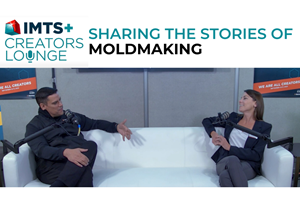Answering the Call: Plastics
Mold builders and processors in the plastics industry are undergoing change as we speak. This change will require businesses to adapt, or they will fail. A marketing communications strategy is key to transforming the image of plastics and manufacturing.
Share
Times Are Changing Fast: Use Marketing to Adapt or Fail
Right now, we are in the middle of the COVID-19 pandemic, awaiting a massive stimulus bill, digesting news about the virus daily, learning about states in lockdown, and experiencing a declining stock market.
I have been in the industry for 25 years. For the last 12 years I work for R&D/Leverage (Lee’s Summit, Missouri) as a global marketing director for the U.S. headquarters and UK facility. Over the years I have admired the many executives in the plastics industry I have worked for and have learned a lot from colleagues and peers as this industry has grown and changed.
As a matter of fact, here is just a sampling of industry changes and their impact on the plastics industry that I have experienced in my career:
- The impact of automation and end of arm tooling on molding and labeling packaging, using one process and not requiring human hands.
- The impact of the Chinese market on U.S. mold manufacturing.
- The impact of acquisitions and mergers on the manufacturing landscape in the late 80s and 90s
- The impact of new steel and aluminum properties helping to make mold manufacturing more cost-competitive.
- The impact of integrated packaging designs into molds.
- The impact of the poor economic market in the 90s on major plastics trade events.
- The impact of new raw material developments on the direction of plastics.
Now fast-forward to today as we experience a pandemic and the world’s reaction and notice a new, very interesting impact: the changing perception of plastics. As the coronavirus hit, state by state restrictions took place, shops closed, the economy paused and all heads turned away from the concept of “evil plastics” to the reality of this life-saving material. But why did it take a pandemic for consumers to wake up to the false narratives they were being fed?
When the media turns its focus, so does the consumer and so does the industry. If the mass media news on the virus was all about the plastics industry instead, what would happen? Our whole industry would be so busy, we would have to change gears, open more shops and expand ourselves.
I come from a marketing communications background. It’s my passion, so I look at things from a very different perspective. Marketing is often overlooked by many moldmakers and converters as an effective communications tool. Before COVID-19 hit, I was all over social media promoting the importance of industry going mainstream with our message about the value of plastics and recycling, as well as the importance of government mandating nationwide recycling programs.
What seemed like an impossible message resonated with many of my peers. Yet, we as an industry were reacting too slow as many OEMs were already making it part of their mission to remove plastic or reduce plastic from all their packaging by certain dates. The industry was beginning to step up with massive fundraising programs from many associations and groups formed to help combat the issue at hand. However, none of them were planning on hitting mainstream media.
In a nutshell, the entire mold manufacturing supply chain must stand together to promote the industry to make people realize the impact it has on the economy.
Then the pandemic hit and every conversation about evil plastics changed. Suddenly the activist went quiet. Suddenly moldmakers and molders were scrambling to fill orders to help aid America in the sourcing of masks, respirators and packaging of all kinds. Suddenly I started reading reports that plastics actually serve this pandemic quite well.
In this unfortunate mess my point is made. Mass media communications is powerful. When the media turns its focus, so does the consumer and so does the industry. If the mass media news on the virus was all about the plastics industry instead, what would happen? Our whole industry would be so busy, we would have to change gears, open more shops and expand ourselves. Yes, I believe it’s that powerful. Drive the message in media, persuade the consumer through education and the markets follow.
The days ahead are unclear, so right now we must hunker down and focus on the bottom line. It’s a survival game. Forecasting is going to be a guessing game. Market share and definitions of markets will change. We will see a stronger reshoring of suppliers, and there’s going to be a start of appreciation of manufacturing again in America. However, to survive long term we have to be able to adapt, or we will fail.
In a nutshell, the entire mold manufacturing supply chain must stand together to promote the industry to make people realize the impact it has on the economy.
When this virus is over, U.S. manufacturing will be stronger, but don’t just hope to ride the wave. Be proactive get your moldmaker and molder together with the OEM and develop a marketing and communications plan that includes the mass media to help transform the image of manufacturing.
Related Content
The Role of Social Media in Manufacturing
Charles Daniels CFO of Wepco Plastics shares insights on the role of social media in manufacturing, how to improve the “business” side of a small mold shop and continually developing culture.
Read MoreIMTS+ Creators Lounge: Sharing the Stories of Moldmaking
Founder/CEO of Industrial Strength Marketing James Soto welcomed MoldMaking Technology editorial director Christina Fuges into the IMTS+ Creators Lounge to talk about sharing the stories of manufacturing using social media and digital tools.
Read MoreSodick Partners with Merrifield Machinery Solutions in Eastern Michigan
Merrifield is welcomed under the umbrella of Sodick machine tool distributors, bringing customers more than 15 years of experience in machine tool sales and support.
Read MoreMMT Chats: Mold Builder Shares “Raw and Real” Social Media Strategy
MoldMaking Technology Editorial Director Christina Fuges sits down with Murphy Forsyth, GM – Injection Molding and Director Of Marketing for Zero Tolerance LLC in Clinton Township, MI.
Read MoreRead Next
How to Use Strategic Planning Tools, Data to Manage the Human Side of Business
Q&A with Marion Wells, MMT EAB member and founder of Human Asset Management.
Read MoreHow to Use Continuing Education to Remain Competitive in Moldmaking
Continued training helps moldmakers make tooling decisions and properly use the latest cutting tool to efficiently machine high-quality molds.
Read MoreAre You a Moldmaker Considering 3D Printing? Consider the 3D Printing Workshop at NPE2024
Presentations will cover 3D printing for mold tooling, material innovation, product development, bridge production and full-scale, high-volume additive manufacturing.
Read More.jpg;maxWidth=970;quality=90)


















.jpg;maxWidth=970;quality=90)